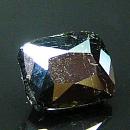|
ClassicGems.net |
|
|
 |
|
Aegirine (also known as Acmite) |
|
|
Discovered in 1835. IMA status: Valid (pre-IMA; Grandfathered) |
|||
|
|
|
Chemistry |
|
|
|
|
|
NaFe3+(Si2O6) |
|
|
|
Sodium Iron Silicate |
|
Molecular Weight: |
231.00 gm |
|
Composition: |
Sodium |
9.95 % |
Na |
13.42 % |
Na2O |
|
|
Iron |
24.18 % |
Fe |
34.56 % |
Fe2O3 |
|
|
Silicon |
24.32 % |
Si |
52.02 % |
SiO2 |
|
|
Oxygen |
41.56 % |
O |
|
|
|
|
|
100.00 % |
|
100.00 % |
= TOTAL OXIDE |
|
|
|
||||
|
Classification |
|
|
|
|
|
Silicates (Germanates) |
|
|
8/F.01-140 |
|
|
|
9 : SILICATES (Germanates)
|
|
Related to: |
Pyroxene Group. Clinopyroxene Subgroup. |
|
Members of Group: |
Pyroxene Group: Canaanite, Clinopyroxene Subgroup, Orthopyroxene Subgroup |
|
Members of Subgroup: |
Clinopyroxene Subgroup: Aegirine, Augite, Clinoenstatite, Clinoferrosilite, Diopside, Essenite, Grossmanite, Hedenbergite, Jadeite, Jervisite, Johannsenite, Kanoite, Kosmochlor, Kushiroite, Namansilite, Natalyite, Petedunnite, Pigeonite, Spodumene |
|
Varieties: |
Urbanite, Vanadian Aegirine |
|
Synonyms: |
Acmite, Acnite, Aegerine, Aegerite, Aegirite, Aegyrina, Aegyrine, Aegyrite, Aemite, Agirine, Jadeite-Aegirine, Natronägirin, Soda-Aegirite |
|
|
|
|
Crystal Data |
|
|
|
|
|
Prismatic crystals, with blunt to steep terminations, to 35 cm, striated lengthwise, can be bent or twisted. In sprays of acicular crystals, fibrous, in radial concretions. |
|
|
Simple and lamellar twinning common. |
|
|
|
|
|
Physical Properties |
|
|
|
|
|
Distinct; Good on {110}, Parting on {100} |
|
|
Irregular/Uneven |
|
|
Brittle |
|
|
6.0 |
|
|
3.50 - 3.60 (g/cm3) |
|
|
None |
|
|
Not Radioactive |
|
|
|
|
|
Optical Properties |
|
|
|
|
|
Green, Dark Green, Greenish Black, Black, Reddish Brown |
|
|
Translucent to Opaque |
|
|
Vitreous to Resinous |
|
|
1.720 - 1.839 Biaxial ( - ) |
|
|
0.037 - 0.061 |
|
|
Moderate to Strong |
|
|
X = emerald green, deep green; Y = grass-green, deep green, yellow; Z = brownish green, green, yellowish brown, yellow |
|
|
|
|
|
Occurances |
|
|
|
|
|
Geological Setting: |
Common in alkalic igneous rocks, carbonatites, and pegmatites. From regionally metamorphosed schists, gneisses, and iron formations; in blueschist facies rocks, and from sodium metasomatism in granulites. An authigenic mineral in some shales and marls. |
|
Common Associations: |
Potassic Feldspar, Nepheline, Riebeckite, Arfvedsonite, Aenigmatite, Astrophyllite, Catapleiite, Eudialyte, Sérandite, Apophyllite |
|
Common Impurities: |
Al, Ti, V, Mn, Mg, Ca, K, Zr, Ce |
|
Co-Type Localities: |
•
Rundemyr, Nedre Eiker, Buskerud, Norway |
|
Year Discovered: |
1835 |
|
View mineral photos: |
|
|
|
|
|
More Information |
|
|
|
|
|
|
|
|
|
|
|
Aegirine, also known as Acmite, is a member of the Pyroxene Group of minerals that includes Aegirine, Diopside, Hedenbergite, Hypersthene, Jadeite, Petedunnite and Spodumene. Aegirine is a fairly common mineral, but rarely available as a gem. Not that gems would be that rare, just that they are not particularily attractive and would only be faceted for the sake of collecting. Gems are very dark green to greenish-black, almost opaque and usually very heavily included. Aegirine is named after Aegir, the Teutonic (Scandanavian) god of the sea. A synonym for the mineral is Acmite, from the Greek word akme for "point" in reference to the typical pointed crystals. Current mineral sources are Mont Saint-Hilaire, Quebec, Canada; Mt. Malosa, Zomba District, Malawi; Kongsberg, Norway; Narsarssuk, Greenland; Kola Peninsula, Russia and Magnet Cove, Arkansas, USA. |
|
|
Aegirine gems for sale: We have not photographed the Aegirine gems yet. Please check back soon. |